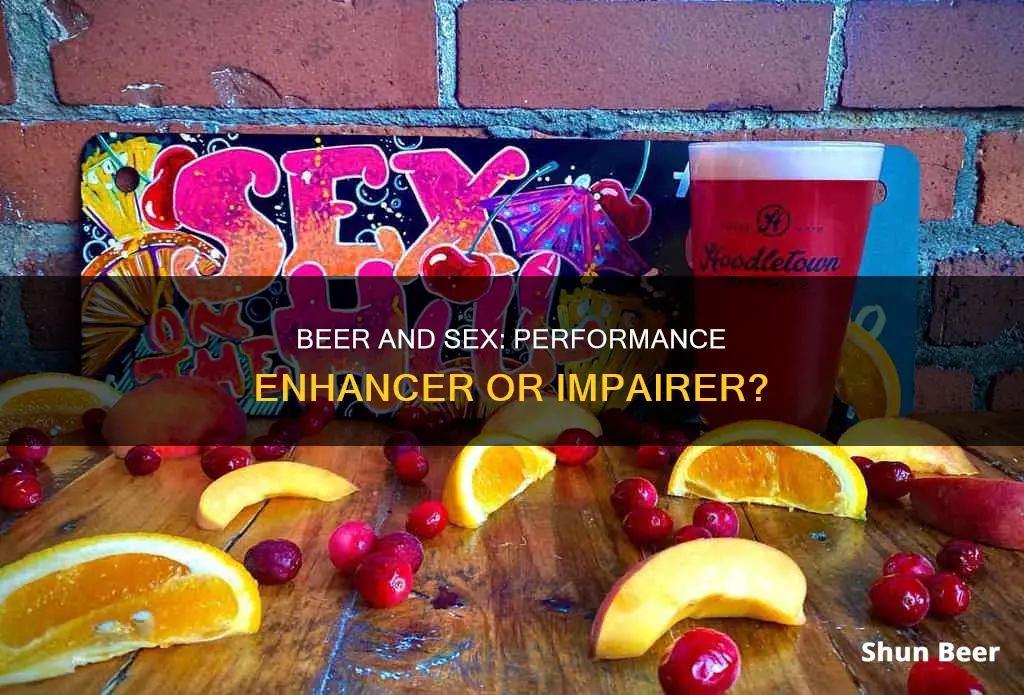
Alcohol has been shown to have a wide range of effects on sexual desire, arousal, and performance. While a drink or two may boost arousal and increase sexual confidence, excessive alcohol consumption can negatively impact sexual function and satisfaction.
For both men and women, alcohol can increase sexual desire and arousal, but only up to a certain point. Higher doses of alcohol can decrease genital response and impair sexual performance, including difficulties with erections, orgasms, and ejaculation. Alcohol also increases the likelihood of engaging in risky sexual behaviours, such as having more sexual partners and unprotected sex, which can lead to sexually transmitted infections and unintended pregnancies.
Additionally, alcohol can have different effects on men and women due to physiological differences in body composition and metabolism. Women tend to become more intoxicated than men when consuming the same amount of alcohol, which can have implications for sexual interest, consent, and function.
Overall, while alcohol may enhance sexual confidence and desire, excessive consumption can lead to negative sexual experiences and increase the risk of sexual assault and domestic violence. It is important to drink responsibly and be mindful of the potential risks associated with mixing alcohol and sex.
| Characteristics | Values |
|---|---|
| Increased sexual desire | One drink may boost sexual desire and arousal, but this is not a sure bet. |
| Sexual arousal | Alcohol can both increase and decrease sexual arousal. |
| Orgasm | Alcohol can make orgasms harder to achieve. |
| Lubrication | Alcohol can make it harder to get wet. |
| Erectile function | Alcohol can cause erectile dysfunction. |
| Risk-taking | Alcohol increases the likelihood of engaging in risky sexual behaviour. |
| STIs | Alcohol is associated with a higher risk of sexually transmitted infections. |
| Consent | Alcohol impairs judgement and can make it difficult to establish consent. |
| Sexual assault | Alcohol is linked to sexual assault and domestic violence. |
What You'll Learn

Alcohol can increase sexual desire and arousal
Alcohol can have a range of effects on sexual desire and arousal. While it can increase sexual desire and arousal, it is not a sure bet.
Drinking a small amount of alcohol can increase sexual desire and arousal in both males and females. This is because alcohol increases testosterone levels in females, which is a male sex hormone that plays a role in sexual desire. It also lowers inhibitions and can make people feel sexier and more confident.
However, drinking too much alcohol can have negative effects on sexual desire and arousal. Excessive drinking can decrease genital response and make it difficult to reach orgasm. It can also lead to risk-taking behaviour, such as having unprotected sex or having sex with multiple partners, which can increase the risk of sexually transmitted infections.
Overall, while a small amount of alcohol may increase sexual desire and arousal, excessive drinking can have negative effects on sexual function and satisfaction.
Is Non-Alcoholic Beer Safe for Kids to Drink?
You may want to see also

It can also decrease sexual arousal
Drinking alcohol can have a range of effects on female arousal, desire, responsiveness, and sexual behaviour. While a drink or two may boost arousal, it is not a sure bet. Research shows that while alcohol may make women think they are horny, too much alcohol can actually decrease genital response.
A 2018 study found that sex lasted longer after drinking alcohol, which may be due to decreased sensation. Females also reported less vaginal lubrication and difficulty reaching orgasm.
Drinking large amounts of alcohol may also lead women to take more risks when it comes to sex. A study of adults in New Zealand found that heavy drinking patterns were associated with more sexual partners, regretted sex, sexually transmitted infections (STIs), and pregnancy terminations.
A 2014 study found that alcohol does indeed make people appear more attractive, particularly those who were not perceived as attractive to begin with. This is not surprising, as alcohol increases socialization, reduces inhibitions, and impairs judgment.
When it comes to alcohol and sex, moderation is key. The more you drink, the worse your genital response and physical arousal.
Craft Beer Binge Drinking: Is It Possible?
You may want to see also

Alcohol can cause sexual dysfunction
Sexual Dysfunction in Men
Alcohol can affect a man's ability to get and maintain an erection. This is known as "whiskey dick" and can be caused by any alcoholic drink, not just whiskey. Alcohol decreases blood flow to the penis and increases angiotensin, a hormone linked to erectile dysfunction. It can also delay ejaculation and cause premature ejaculation.
In addition, alcohol can interfere with testicular function and male sex hormone production, which can lead to erectile dysfunction and infertility. Chronic alcohol use is also associated with a higher risk of sexual dysfunction in men, including erectile dysfunction, premature ejaculation, and a lack of sex drive.
Sexual Dysfunction in Women
While alcohol may increase sexual desire in women by increasing testosterone levels, too much alcohol can negatively affect physiological responses and decrease genital response and physical arousal. It can also make it harder to orgasm and lubricate, leading to discomfort during intercourse.
Other Risks
In addition to sexual dysfunction, drinking alcohol before sex can lead to risky sexual behaviors, such as unprotected intercourse and having more casual or multiple sexual partners. This can increase the risk of sexually transmitted infections (STIs) and HIV. It can also lead to negative outcomes such as unplanned pregnancy and the transmission of existing diseases between partners.
Therefore, while a small amount of alcohol may enhance sexual experiences, excessive consumption can impair sexual function and lead to negative health outcomes.
Beer and Zyrtec: Is It Safe to Mix?
You may want to see also

It can increase the likelihood of casual sex and sexual risk-taking
Alcohol is often consumed to reduce inhibitions and increase confidence in social and sexual situations. However, while a drink or two may have positive effects on sexual desire and arousal, excessive alcohol consumption can lead to casual sex and increased sexual risk-taking.
Several studies have found a positive association between alcohol consumption and casual sex, particularly among teenagers and young adults. Alcohol is a key component in casual sexual encounters, and its consumption can lower inhibitions and increase the likelihood of engaging in sexual activity with someone one might not usually consider.
Additionally, alcohol intoxication is strongly linked to sexual risk-taking behaviours. Individuals who mix drinking and sex are less likely to discuss contraception and sexual infection prevention, and are also less likely to use condoms or use them correctly. This can lead to an increased risk of sexually transmitted infections (STIs) and unintended pregnancies.
For example, a 2016 study found that males are more likely to engage in unprotected sex when under the influence of alcohol. Similarly, a study of adults in New Zealand suggested that heavy drinking patterns were associated with more sexual partners, regretted sex, STIs, and pregnancy terminations.
Furthermore, alcohol consumption can impair judgement and affect memory, making it difficult to recall the details of a sexual encounter or even whether clear consent was given. This can have serious implications, as engaging in sexual activity without consent constitutes sexual assault or rape.
Therefore, while alcohol may initially increase sexual desire and arousal, excessive consumption can lead to casual sex and increased sexual risk-taking behaviours, potentially resulting in negative consequences such as STIs, unintended pregnancies, and sexual assault.
Beer Drinking: A New Allergy Risk?
You may want to see also

Alcohol is linked to sexual assault and domestic violence
Alcohol is also a factor in 40% of reported domestic violence cases in the US. The intensity of violence is greater when the offender is intoxicated compared to when they are not. Alcohol consumption is more related to the severity of domestic violence rather than its occurrence.
Alcohol is also linked to sexual assault. Individuals who drink before having sex are more likely to engage in risky sexual behaviours, such as intercourse without barrier protection, and inconsistent condom use. Alcohol can also make it harder for individuals to process what is happening, making it difficult to give or receive clear consent.
Beer and Creatine: Mixing Alcohol and Supplements
You may want to see also







